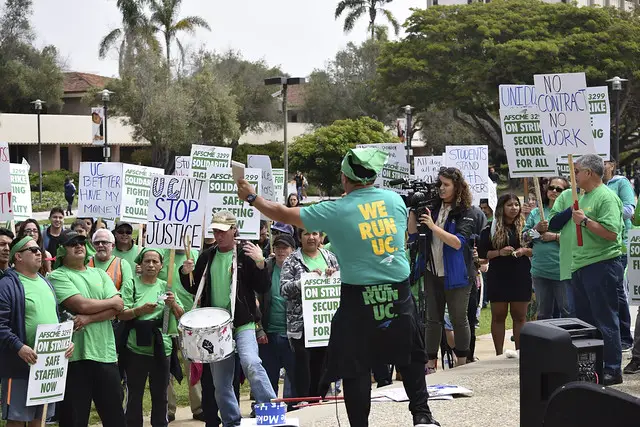On April 12, the tense saga between AFSCME 3299, the University of California’s largest employee union, and the University of California system continued with another protest. This was the latest in an installment of protests that have been going on every quarter at UCSB over the past three years.
Those protesting were UC workers who feel as though the university system has continued to treat them unfairly, and students who wished to stand in solidarity with those in charge of campus maintenance.
The protestors set up shop in front of Storke Tower. While about 100 people came out for this protest, protests in the past have reached upward of five hundred participants.
According to a new study commissioned by AFSCME Local 3299, the starting wages for Latino and Black workers within UC’s low wage workforce are typically 21 percent and 20 percent lower than those of white workers, respectively. About 80 percent of the UC workers are Latino.
Additionally, the number of Black workers employed within the university’s service and patient-care workforce has continued to decrease over time, according to the report.
Ricardo Orozco has been a custodian at UCSB for eight years, working the 2 a.m. to 10:30 a.m. shift. As the media contact for AFSCME 3299, Orozco said union members are protesting the University of California system’s unfair labor practices.
“The UC is intimidating custodians,” Orozco told The College Post. He added that the university has also told workers that “not coming to work can hurt you,” in an attempt to halt the protests in the past.
According to Orozco, the union members are also protesting for job security as the university continues to outsource jobs to part-time temporary agency employees to cut overall costs.
“They need to stop outsourcing work that we can be doing,” Orozco said. “They are paying temp agencies half of what we would be getting paid and not giving them any benefits.”
One way that the union raises awareness about these issues is by marching around campus with speakerphones, drums, and posters. However, some students have recently taken to one of UCSB’s most populated Facebook pages, ‘UCSB Free & For Sale’, to express displeasure with the protests, claiming they they have caused them to lose sleep or to lose focus while studying for exams.
“It’s what we need to do,” Orozco said, in response to the student complaints. “It sucks, but that’s the only way.”
Dylan Kupsh is a UCSB student who has been volunteering with the AFSCME for two years and is part of the committee that puts together the protests. Kupsh told The College Post that the union workers’ contract, which is currently being deliberated, is basically “a huge mess one-hundred page document.”
Kupsh defended the recent workers strikes since they “are a part of the contract negotiation” process and a way for workers to workers to do “what matters most to them: Keeping their jobs for the future.”
Orozco added that student help has been a critical part of pulling off successful protests, and that the union workers are thankful for students who have participated in any way possible.
“I want to hug them and thank them for their work with the union,” Orozco said.
The workers union has more protests planned in the future but the dates have not yet been finalized. A contract negotiation was expected to take place on April 24.
Rutgers University Agrees to Faculty Demands to Avert Strike



